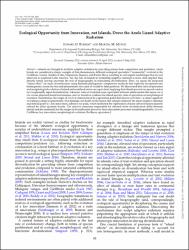/admin/item?itemID=59b4a342-6e31-4e9c-82d7-f7c30036257a
Ecological opportunity from innovation, not islands, drove the anole lizard adaptive radiation

Ver/
Tipo de acceso
AbiertoTipo de Material
ArtículoTipo de Contenido
Investigación científicaIdioma
InglésAudiencia
Técnicos, profesionales y científicosColección
- Investigación ambiental [1758]
Metadatos
Mostrar el registro completo del ítem| Sinopsis: | Islands are thought to facilitate adaptive radiation by providing release from competition and predation. Anole lizards are considered a classic example of this phenomenon: different ecological specialists ("ecomorphs") evolved in the Caribbean Greater Antilles (Cuba, Hispaniola, Jamaica, and Puerto Rico), resulting in convergent assemblages that are not observed in mainland Latin America. Yet, the role of islands in facilitating adaptive radiation is more often implied than directly tested, leaving uncertain the role of biogeography in stimulating diversification. Here, we assess the proposed "island effect" on anole diversification using Bayesian phylogenetic comparative methods that explicitly incorporate rate heterogeneity across the tree and demonstrate two cases of would be false positives. We discovered that rates of speciation and morphological evolution of island and mainland anoles are equivalent, implying that islands provide no special context for exceptionally rapid diversification. |
| Autor(es): | Burress, Edward D.
Muñoz, Martha M. |
| Año: | 2022 |
| Publicado: | Systematic Biology, 71(1), 93-104 |
| Citación: | Burress, E. D., & Muñoz, M. M. (2022). Ecological opportunity from innovation, not islands, drove the anole lizard adaptive radiation. Systematic Biology, 71(1), 93-104. Recuperado de: |
| URI: | https://bvearmb.do/handle/123456789/1482
|

